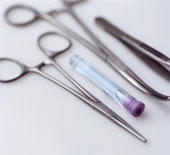Dog Neutering Pros and Cons - Spaying and Castration
In female dogs, spaying will of course stop unwanted pregnancies but is also carried out for a number of other reasons such as cases where phantom pregnancies are a problem for the bitch. Intact (non-spayed) bitches also seem to be at increased risk of cancers and infections. An intact bitch who is not mated has been shown to carry an increased risk of pyometra (uterine infection) with each season she experiences. Other research has looked at reported increased risks of mammary tumours in intact females (see our article Dog Mammary Tumours and Mammary Cancer).

In male dogs, neutering is most often performed for fertility reasons and also to decrease certain unwanted behaviours, for which it may or may not be effective.
While some vets spay and castrate dogs as a matter of course, others believe each case should be judged on its own merits. Looking at the various pros and cons of neutering can help an owner decide what is best for their dog. Many believe neutering of dogs should be carried out routinely while others believe that neutering should only be done for specific medical or social reasons.
Pros of Neutering
- Eliminates risk of pyometra in females (pus-filled infected uterus).
- Strongly believed to decrease the risk of mammary tumours (breast cancer) in females.
- Eliminates the risk of testicular cancer in males and uterine cancer in females.
- Stops unwanted pregnancies.
- Stops phantom pregnancies.
- Can improve a bitch’s mood if they are prone to depression during their cycle.
- Can decrease behaviours in males such as hypersexuality, roaming and dominant or aggressive behaviours. Such behaviours include relentlessly seeking bitches, humping, leg cocking indoors, aggression shown to other males.
- Can make dogs calmer and more obedient.
- Future problems with additional dogs or even children are potentially lessened.
Cons of Neutering
- Can affect the coat, making it thick and heavy.
- Can affect weight, making them more prone to weight gain.
- Females may be more at risk of metabolic and hormonal conditions such as diabetes and Cushing’s disease.
- Research shows that neutering may predispose males to cruciate ligament rupture. Females may also be more prone to joint and ligament problems.
- Neutering has been associated with possible incontinence later in life or even immediately following the surgery. Research seems to suggest that in females, incontinence can largely be avoided if the bitch is spayed after her first season but also suggests that spaying before the first season reduces the risk of breast cancers.
- Other dogs can be confused by a neutered male. The neutered male may be mounted and dominated by other males.
- In some cases, male aggression can actually be made worse.

What Does Neutering Involve?
Neutering is done under general anaesthetic. With a dog, the testicles are removed and the dog is generally home the same day. For a female spay the ovaries and uterus are removed. Spaying is more involved but is often done via keyhole surgery these days and again the bitch should be home the same day.
Although surgery and general anaesthetic always involves some risk, both procedures are considered to be routine. Surgery is always worth discussing with your vet though, so the vet can take your own dog's age and health into account.
When To Neuter?
With females it is often thought that the best time to spay is at 9-12 months old, mid way between their first season and the next. Mid-cycle is preferable because the uterus has minimal blood supply at this time (less risk of haemorrhage) and hormone levels are low (less risk of hormonal disturbances). However, as the risk of issues such as mammary cancers increases with each season, many believe the female should be neutered before her first season. The younger and fitter the bitch the easier the operation will be. In males, castration is usually performed at around 6-9 months old (please see update below).
Update
When to neuter has become a hot topic since this article was written. While the advice for bitches remains unchanged, as far as I know, more recent thoughts are that male dogs should only be neutered once they are fully mature, physically and mentally, and then only if necessary.
By Jenny Prevel
© D for Dog www.dfordog.co.uk
This article belongs strictly to D for Dog and we do not authorise the copying of all or any part of it.
